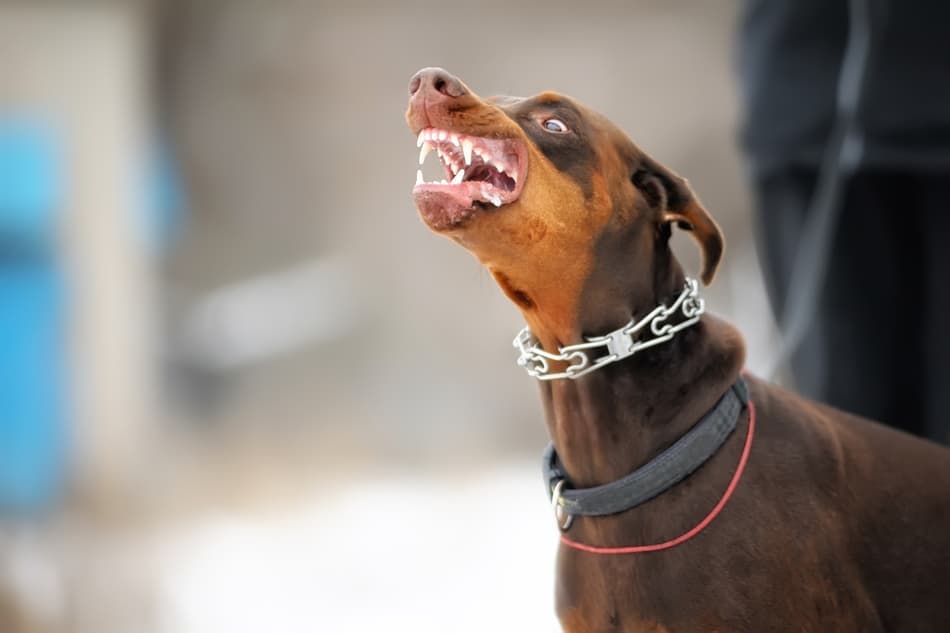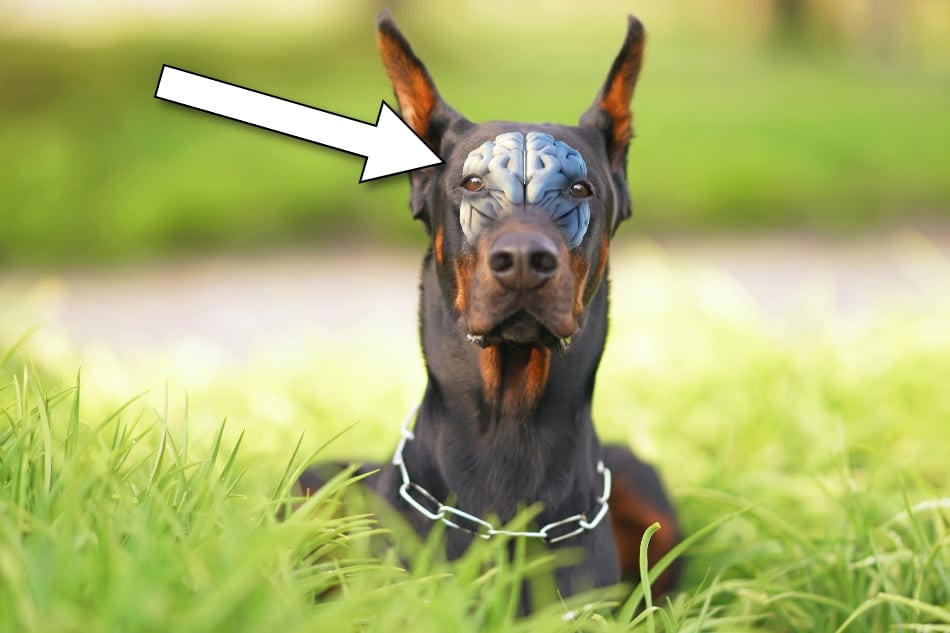When it comes to owning a Doberman, one common concern that many people have is whether their Doberman will ever attack them. It’s a valid question, considering the Doberman’s reputation as a guard dog. But let’s put your mind at ease with some surprising facts. Did you know that Dobermans are actually known for their loyalty and protective nature towards their owners? While they can be wary of strangers, Dobermans are generally not aggressive towards their own family members. Understanding the nature of this breed can help alleviate any fears you may have about your Doberman attacking you.
Dobermans have a long history as working dogs, originally bred for protection and as guard dogs. Over the years, they have gained a reputation for their intelligence and fearlessness. However, it’s important to note that aggression in Dobermans is not inherent but can be a result of poor training or mistreatment. In fact, responsible breeding and proper socialization from an early age can help prevent any aggressive tendencies in your Doberman. It’s also essential to establish yourself as the pack leader through consistent training and positive reinforcement. By providing a loving and structured environment, you can ensure that your Doberman will not pose a threat to you or your family.
While it is possible for any dog to become aggressive, Dobermans are known to be loyal and protective. However, aggression towards their owners is very uncommon. Proper socialization, training, and a loving environment can help ensure a well-behaved Doberman. It’s essential to establish yourself as the leader and provide consistent, positive reinforcement. Early socialization and obedience training are crucial for raising a well-behaved and non-aggressive Doberman.

Will My Doberman Attack Me?
Many people who are considering getting a Doberman as a pet often have concerns about their temperaments and whether or not they will be prone to aggression. One common question that arises is, “Will my Doberman attack me?” It’s an important question to address, as it relates to the safety and well-being of both the owner and the dog. In this article, we will explore the factors that can contribute to a Doberman’s behavior, debunk some misconceptions, and provide guidance on how to prevent aggression in these wonderful dogs.
Understanding Breed Characteristics
Dobermans are a breed known for their loyalty, intelligence, and protectiveness. While these qualities make them excellent family pets and guard dogs, they can also be misconstrued as signs of aggression. It’s important to understand that a Doberman’s behavior is influenced by a combination of genetics, training, and socialization.
Dobermans that come from reputable breeders who prioritize temperament breeding are more likely to have stable and predictable temperaments. Responsible breeding practices aim to produce dogs that are not overly aggressive or fearful.
However, even with well-bred Dobermans, proper training and socialization are crucial. Early socialization with different people, animals, and environments helps them develop into well-rounded dogs. Ongoing training and positive reinforcement techniques are important for teaching obedience and appropriate behavior.
Signs of Aggression in Dobermans
While Dobermans can be protective and assertive, it’s essential to distinguish between normal behavior and actual aggression. Here are some signs that may indicate aggression in a Doberman:
- Growling, snarling, or baring teeth
- Intense and prolonged staring
- Stiff body posture and raised hackles
- Unpredictable or unprovoked biting
If you notice any of these signs, it’s important to consult a professional dog behaviorist or trainer who specializes in aggression issues. They can assess the situation and provide guidance on how to address the behavior safely and effectively.
Preventing Aggression in Dobermans
Preventing aggression in Dobermans starts with responsible ownership and proactive training. Here are some tips to promote a well-behaved and non-aggressive Doberman:
- Start training early: Begin training your Doberman from an early age and focus on positive reinforcement techniques. Reward good behavior and provide consistent guidance.
- Socialize extensively: Expose your Doberman to various people, animals, and environments to help them develop social skills and confidence. Gradually expose them to new experiences and provide positive associations.
- Provide mental and physical stimulation: Dobermans are intelligent and active dogs that thrive with regular mental and physical exercise. Engage them in activities that challenge their minds and keep them physically active.
- Establish clear boundaries: Dobermans need consistent rules and boundaries to understand what is expected of them. Use positive reinforcement to reward desirable behavior and redirect or discourage unwanted behavior.
| Training | Socialization | Exercise | Boundaries |
| Positive reinforcement | Exposure to different people, animals, and environments | Mental and physical stimulation | Consistent rules and boundaries |
The Importance of Professional Guidance
If you’re concerned about your Doberman’s behavior or potential for aggression, it’s important to seek professional guidance. A skilled dog behaviorist or trainer experienced with Dobermans can assess your specific situation and provide tailored advice.
Remember, aggression in Dobermans is not a common trait if they are properly bred and trained. With the right approach, proper socialization, and consistent training, your Doberman can be a well-behaved and loving companion.
Are Dobermans Dangerous?
Despite the misconceptions and stereotypes surrounding their temperament, Dobermans are not inherently dangerous dogs. Their reputation as aggressive dogs stems from a combination of factors, such as their physical appearance, protective nature, and occasional instances of improper breeding or training.
It’s important to understand that any dog, regardless of breed, has the potential to become aggressive if not properly trained, socialized, or cared for. Responsible ownership, training, and socialization are key to preventing aggression in any dog, including Dobermans.
Key Takeaways: Will My Doberman Attack Me?
- Dobermans can be loyal and friendly dogs when properly trained and socialized.
- A well-trained Doberman is unlikely to attack its owner unless it feels threatened or provoked.
- Regular exercise, mental stimulation, and positive reinforcement training are crucial for a well-behaved Doberman.
- Early socialization with people and other animals is important to prevent aggressive behavior.
- Seek professional help if you notice any signs of aggression in your Doberman.
Frequently Asked Questions
Here are some commonly asked questions related to the behavior of Doberman dogs when it comes to aggression towards their owners.
1. How can I prevent my Doberman from becoming aggressive?
Preventing aggression in Dobermans starts with proper socialization and training from an early age. Introduce your dog to a variety of people, animals, and environments to help him develop good social skills. Provide consistent and positive reinforcement training to establish yourself as the pack leader and reinforce desired behavior. Avoid using punishment-based training methods as they can lead to fear or aggression. Regular exercise and mental stimulation are also essential to prevent boredom and frustration which can contribute to aggression.
If you’re unsure about how to train your Doberman or deal with any signs of aggression, consult a professional dog trainer or behaviorist who specializes in working with Dobermans or similar breeds.
2. What are some signs that a Doberman might become aggressive towards their owner?
While aggression can vary between individual dogs, there are some common signs to watch for:
– Excessive growling or snarling
– Baring teeth or snapping
– Stiff body posture and raised hackles
– Intense staring or avoiding eye contact
– Lunging or biting
If you notice any signs of aggression, it’s important to address them promptly by consulting a professional dog trainer or behaviorist to assess the situation and provide guidance on how to manage and modify your Doberman’s behavior.
3. Can a well-trained Doberman still attack their owner?
While it is rare for a well-trained and properly socialized Doberman to attack their owner, there can be rare instances where they may display aggressive behavior. It’s important to remember that dogs, like any living creature, can have unpredictable moments or react to certain triggers. It’s crucial to continue providing ongoing training, socialization, and environmental enrichment to minimize the risk of aggressive behavior.
If you have concerns about your Doberman’s behavior, consult with a professional to address any underlying issues and ensure the safety of both you and your dog.
4. Are Dobermans naturally prone to aggression towards their owners?
Doberman Pinschers, like any breed, can vary in temperament and behavior. It’s important to note that Dobermans are not naturally prone to aggression towards their owners. With the right breeding, socialization, and training, they can become loyal and loving family pets.
However, improper breeding, poor socialization, neglect, abuse, or a lack of training can contribute to aggressive behavior in any dog breed, including Dobermans. It’s essential to choose a responsible breeder and invest time and effort in training and socializing your Doberman to promote a well-balanced and non-aggressive temperament.
5. What should I do if my Doberman displays aggressive behavior towards me?
If your Doberman displays aggressive behavior towards you, it’s important to prioritize your safety. Avoid any actions that may escalate the situation, such as cornering or physically challenging the dog.
Consult with a professional dog trainer or behaviorist who specializes in working with aggression issues. They can help assess the situation, identify the underlying cause of the aggression, and develop a customized behavior modification plan to address the issue.
In the meantime, ensure you have proper control measures in place, such as using a muzzle or a secure harness, to prevent any potential incidents while seeking professional guidance.

DOBERMAN TRAINING! How To Stop Doberman Attacking Other Dogs!
Dobermans have a reputation for being protective and loyal to their owners. While they are generally gentle and obedient, any dog, including a Doberman, has the potential to become aggressive if not properly trained and socialized. It is important to establish clear boundaries, provide consistent training, and socialize your Doberman from an early age to minimize the chances of aggression.
Ultimately, whether or not your Doberman will attack you depends on how it is raised and trained. With proper care, attention, and socialization, your Doberman should be a loving and loyal companion, rather than a threat. Remember to consult with a professional trainer or behaviorist if you have any concerns about your Doberman’s behavior.
